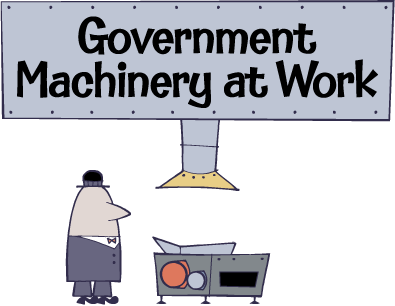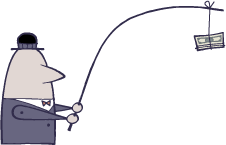



































Throughout your life you will have to deal with government. If you try to get around it, the government will deal with you. This, boys and girls, is the story of how government is made and how it works. While you might not be all that interested in the government, the government is interested in you. You may as well learn about it and learn to live with it.
Before government there was the law of the jungle, which is more of a catch-phrase than actual law. This law was basically anarchy, from the Greek meaning anything goes. Despite what you see in animated films with talking animals, the jungle is a violent and dangerous place where animals fight over things and eat each other and whatnot. To prevent this sort of thing happening to them, people created rules. Like, no eating your neighbor’s food, and no eating your neighbor either.
To enforce the rules people created rulers to lay down the law. Some examples of rulers are kings, queens, overlords, tyrants, emperors, dictators and dear leaders. A large group of rulers is called government, from the Latin meaning power tools.
Government rules over the people and also over the rules. That is, it decides what rules mean and how to use them. Government can also overrule the rules by writing new rules called amendments, acts, laws, regulations, mandates, directives, decrees, court orders, endangerment findings, executive orders, and dictates. Or the government simply overrules rules by ignoring them as convenience, or rulers, dictate.
There are also unwritten rules, called the spirit of the law. Like other types of spirits, ghosts for instance, you never know when or where some spirit of the law will appear. Or whether they’re real or not. These rules are written between the lines to be discovered by judges and lawyers as the need arrises.
These many types of rules are created to make people behave themselves, or at least behave the way the government would like them to. Over the centuries many types of government were tried. Monarchy: rule passed down through the family. Theocracy: rule by priests or religious doctrine. Democracy: rule by the people, or in the name of the people since most people are busy doing other things. Autocracy: rule by cars. Plutocracy: rule by the animated cartoon dogs.
By a long margin the most common type of government is Bureaucracy: rule by nameless, faceless civil servants. Though if you ask your average person they’ll say these civil servants aren’t very civil and the service is pretty bad. But don’t listen to them, they don’t understand how the bureaucracy really works because… well, nobody does.
In America we have Democratic-Bureaucracy where a handful of popularly elected rulers oversee a vast army of bureaucrats who do the actual ruling work of government — writing and enforcing the multitude of rules, regulations, laws, etc. Oddly enough, the popularly elected rulers are actually pretty unpopular.
Because civil service laws protect bureaucrats against being fired or disciplined, the elected rulers have little control over the bureaucracy. This happened because people wanted to take politics out of the bureaucracy. Which is odd because democracy was supposed to give voters power over government, yet since 99% of government is bureaucracy voters now hold sway over 1% of government.
Government in any form has two main ways of ruling which make up the two branches of government, force and bribery. The force branch of government consists of police, courts, red tape, taxes, and lawyers. The bribery branch comes as subsidies, tax breaks, loopholes, welfare, and more lawyers.



The force branch of government is relatively straightforward and easy to understand. By government standards, that is. The two important words here are fear and coercion. Fear works from the threat of coercion and is called deterrence, which is a more pleasant and official sounding term than fear. For the fearless element there is coercion, which is where the government grabs you bodily and locks you away, takes your money and property or, in extreme cases, shoots you.
POLICE are employed to nab bad people who break the rules and put them in jail. Police also try to prevent crimes from happening in the first place. This is pretty hard to do because a criminal isn’t a criminal until they do something, you know, criminal. Hard to prevent crime after the fact. The police also enforce laws by handing out tickets, warnings, stern looks or beatings.
COURTS determine if the people arrested by the police are guilty or not and punish them with jail sentences, fines, probation, or slaps on the wrist. They also settle civil disputes over contracts, marriages, child custody, and problems of folks being stupid and annoying rather than outright criminal. Courts also interpret the law. Which means they translate legalese into legal language to mean what they need it to mean on a court case by case basis.
RED TAPE is used to tie things up and hamper activity of all kinds, both good and bad. Less total activity means less bad activity so they accept the trade-off of less good activity. Red tape also prevents people the government doesn’t like from doing things that are legal by making it too much of a hassle. This doesn’t stop it altogether, but keeps it to a minimum and so is easier to rule over.
TAXES are often levied on things the government wishes to discourage or control by making it expensive. Like tobacco, alcohol, fatty foods, and being rich. This doesn’t stop people from doing these things because they like smoking, drinking, fatty foods, and being rich. But the government figures it may as well make some money off it.
LAWYERS are employed in all four areas above so what seems like a straight-forward system becomes a battlefield of wheeling and dealing give-and-take. The lawyers’ take being large fees and retainers.


The bribery branch of government is more varied and subtler in operation, which is to say harder to figure out. The important words here are greed and persuasion. Greed, officially called self-interest, is one of those common human traits that can always be relied on. This explains why the bribery branch is so big. People can be persuaded to do all kinds of nonsensical things they wouldn’t even consider otherwise because greed is an easy sell.
SUBSIDIES are outlays, a government word for pay-offs, to get people to do things the government likes that wouldn’t make sense otherwise by hiding the costs in taxes paid by other people. This works so long as there are enough unsubsidized sensible things going on to pay taxes to bankroll the subsidized unsensible things. So the sensible businesses raise prices to pay the taxes subsidizing unsensible things and everything costs more. This way people blame higher prices on greedy capitalists instead of the government.
TAX BREAKS are used to persuade folks to do what the government likes the same way as subsidies. However, instead of giving you tax money paid by others, they let you keep some of your own money instead. This makes government seem generous by giving you a gift you pay for yourself. Oddly enough, this seems to work for many people. A lot like getting a tax refund, which is a return of your own money you overpaid to begin with.
LOOPHOLES are workaround benefits for the clever to avoid the police, courts, red tape, and taxes. Loopholes are put into a bit of legislation so rules and laws which are unpleasant for the government or its friends can be gotten around legally. This way when you do things the government likes your competition pays for it. Or better yet, your competition goes to jail for doing the same things you did to get rich.
WELFARE is outlays to, how to put it… failures? No, that’s unkind. Let’s say unfortunate people. Unlike subsidies, these are given not to get people to do something, but to tide them over while they do nothing until election time when hopefully they remember who got them the goodies in the first place so they vote for more of the same. In this last respect, kinda like subsidies after all.
LAWYERS are employed in all four areas above to try to make sense of a lot of what doesn’t make much sense. They also try to help clarify the difference between the letter of the law and the spirit of the law, which usually is whatever works in their client’s best interests.
Speaking of interests, this is where the bribery branch differs from the force branch which is applied equally to all. In theory, at any rate. The bribery is divied up by group memberships and/or interests. These are owned and operated by advocacy groups, labor unions, corporations, secret societies, and cabals which each form what’s called a PAC, or political action committee. PAC is a fancy term for what amounts to a lobby. People don’t like lobbyists, unless they’re on their side in which case they’re just influential spokespersons.




Government is an expensive, money-losing operation and must be paid for. After all, unionized bureaucrats must be over-paid and all that bribery must be funded. Plus the government keeps expanding. Bigger costs more. Complexer costs more. Bigger and complexer costs more and more.
People pay for the government they get through income taxes, sales taxes, property taxes, import taxes, business taxes, capital gains taxes, estate taxes, fees, fines, and penalties disguised as taxes. People pay for the government they want by the means described below.
While bribery going from the government to the people is largely approved of, at least by the recipients, bribery in the other direction is fairly well frowned upon. To get around this we have a system of indirect bribery called campaign finance. The money goes to the politicians who then go to government offices and pretend there’s a difference from donations to a politician and pay-offs to an office holder, even though they are the same person. The difference being largely geographic, one is on the campaign trail the other in the halls of government.
This is where PACs come back into it adding yet another layer to further separate the voter’s personal interest from the special interest of the PAC working against the vested interests of the other PACs. In this way the flow of donations is indirect and fair, or is untraceable so you can’t tell. All of which goes to further separate the voters from their money.
Then there is a small handful of folks outside all that whose only interest is in being left alone. This group is much smaller than you might suppose because many belong to groups that are being advocated for or against whether they actually join in or like it or not. Come to think of it, considering the number of PACs that exist there likely aren’t any of these people at all.
You might think voting for and paying the salary of an office holder should give you some influence. Think again. Campaign contributions swamp salaries by 100 to one. You don’t think all US Senators are millionaires from scrimping and saving out of their salaries, do you?
Besides, 99% of the government are protected, unionized bureaucrats who can’t be voted out or fired. These folks join the government because they believe in government whether what they do works for anyone else or not. When such people say they work for the government they mean exactly that, they work for the government, and not for you. It’s just like when politicians and establishment spokesmen talk about “our democracy.” They mean it’s theirs and not yours.
And that, boys and girls, is the story of government. Perhaps you understand it, probably not. Not because the explanation makes no sense, but a lot of government makes no sense. In the end, none of us escape the long arm of the law until we’re dead and buried. When you consider estate taxes, not even then.
© Terry Colon, 2014